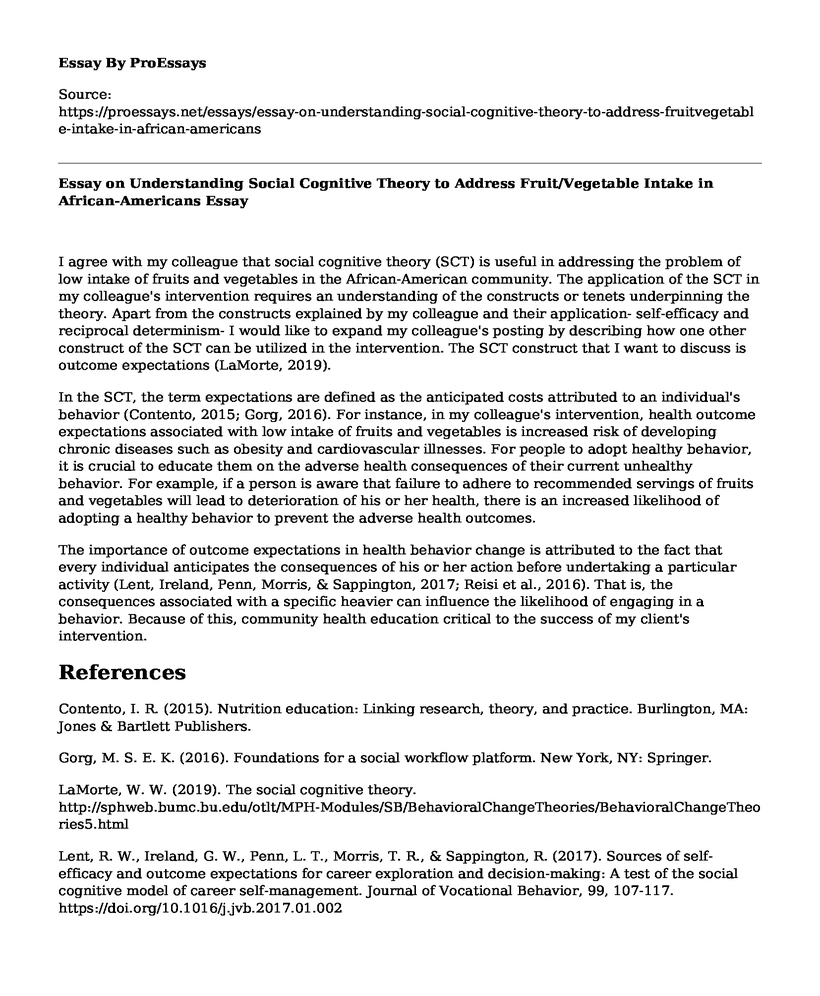I agree with my colleague that social cognitive theory (SCT) is useful in addressing the problem of low intake of fruits and vegetables in the African-American community. The application of the SCT in my colleague's intervention requires an understanding of the constructs or tenets underpinning the theory. Apart from the constructs explained by my colleague and their application- self-efficacy and reciprocal determinism- I would like to expand my colleague's posting by describing how one other construct of the SCT can be utilized in the intervention. The SCT construct that I want to discuss is outcome expectations (LaMorte, 2019).
In the SCT, the term expectations are defined as the anticipated costs attributed to an individual's behavior (Contento, 2015; Gorg, 2016). For instance, in my colleague's intervention, health outcome expectations associated with low intake of fruits and vegetables is increased risk of developing chronic diseases such as obesity and cardiovascular illnesses. For people to adopt healthy behavior, it is crucial to educate them on the adverse health consequences of their current unhealthy behavior. For example, if a person is aware that failure to adhere to recommended servings of fruits and vegetables will lead to deterioration of his or her health, there is an increased likelihood of adopting a healthy behavior to prevent the adverse health outcomes.
The importance of outcome expectations in health behavior change is attributed to the fact that every individual anticipates the consequences of his or her action before undertaking a particular activity (Lent, Ireland, Penn, Morris, & Sappington, 2017; Reisi et al., 2016). That is, the consequences associated with a specific heavier can influence the likelihood of engaging in a behavior. Because of this, community health education critical to the success of my client's intervention.
References
Contento, I. R. (2015). Nutrition education: Linking research, theory, and practice. Burlington, MA: Jones & Bartlett Publishers.
Gorg, M. S. E. K. (2016). Foundations for a social workflow platform. New York, NY: Springer.
LaMorte, W. W. (2019). The social cognitive theory. http://sphweb.bumc.bu.edu/otlt/MPH-Modules/SB/BehavioralChangeTheories/BehavioralChangeTheories5.html
Lent, R. W., Ireland, G. W., Penn, L. T., Morris, T. R., & Sappington, R. (2017). Sources of self-efficacy and outcome expectations for career exploration and decision-making: A test of the social cognitive model of career self-management. Journal of Vocational Behavior, 99, 107-117. https://doi.org/10.1016/j.jvb.2017.01.002
Reisi, M., Mostafavi, F., Javadzade, H., Mahaki, B., Tavassoli, E., & Sharifirad, G. (2016). Impact of health literacy, self-efficacy, and outcome expectations on adherence to self-care behaviors in Iranians with type 2 diabetes. Oman Medical Journal, 31(1), 52-59. https://doi.org/10.5001/omj.2016.10
Cite this page
Essay on Understanding Social Cognitive Theory to Address Fruit/Vegetable Intake in African-Americans. (2023, Mar 26). Retrieved from https://proessays.net/essays/essay-on-understanding-social-cognitive-theory-to-address-fruitvegetable-intake-in-african-americans
If you are the original author of this essay and no longer wish to have it published on the ProEssays website, please click below to request its removal:
- Importance of Friends Essay
- Essay on Similarities and Differences between Theme in the Hunger Games and the Societal View
- Essay Sample on Gender Roles
- Essay Sample on Hate Crime on Campus
- Essay Sample on Helping Professions Issues
- Essay Sample on Active Listening: Key to Successful Managerial Communication
- Essay Example on Police Task Forces: Changes, Challenges & Strategies







